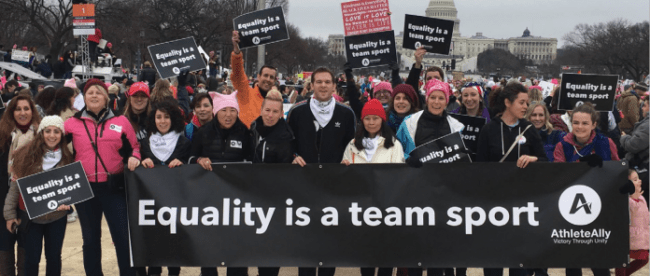DEI Initiatives in Sports Organizations Post-Fair Admissions

(Source)
Diversity, equity, and inclusion (commonly referred to as DEI), are “three closely linked values held by many organizations that are working to be supportive of different groups of individuals, including people of different races, ethnicities, religions, abilities, genders, and sexual orientations.” Organizations, including sports organizations, use DEI initiatives to promote these values. An organization may implement strategies or policies to foster a diverse and inclusive workplace with equal opportunities. One example of a DEI initiative is the NHL’s Street program; this is a youth street hockey experience that engages families with recreational programming designed to drive a new era of street hockey. The program is meant to reach a greater and more diverse group of hockey participants, transcending limits related to infrastructure and climate.
However, the Students for Fair Admissions v. Harvard is a new landmark decision that will have widespread implications on affirmative action and DEI initiatives. While the case focuses on college admissions, the ramifications of this decision on DEI efforts in the workplace are still being examined across the country today. Many are worried about the negative impact the SFFA case will have on DEI programs; the court’s decision and subsequent rationale could provide organizations a plausible excuse for why they do not promote diversity within their workplace environment. While SFFA imposes limitations on affirmative action, its effects outside this area could be overexaggerated and exploited by critics of diversity.
The Court held that Harvard and UNC’s admission process violated the Equal Protection Clause of the Fourteenth Amendment. The Court previously stated race-based college admissions are permissible when they (1) comply with strict scrutiny, (2) do not use race as a stereotype or a negative, and (3) must end at some point; the Court reasons that the Harvard and UNC admissions systems fails all these requirements and therefore must be violated under the Equal Protection Clause of the Fourteenth Amendment. The obvious impact of this case is that universities will decrease or end their race-based admissions process when trying to diversify their student enrollment. The Court did not outright overturn Grutter v. Bollinger, but heavily limited its application.
Universities can no longer use race as a sole factor for admissions, such as Harvard’s use of race as a determinative factor on their lop list. They will also now have to navigate how to supplement this judicial loss and still create a racially diverse environment with a more colorblind process. However, colorblind admission processes often struggle to actually create diversity; therefore, there will likely be a dramatic drop in racial diverse admittees in the upcoming admission cycles since the Court’s decision. Universities who do not actually care about diverse student populations will find it easier to dismiss DEI initiatives because they can hide behind this case’s ruling.
The immediate impact of this case remains to be seen outside the collegial context. Academic focus regarding DEI in sport organizations has shifted to this very topic. This case may have a strong negative impact on DEI in sports. Organizations that struggle with diversity, such as the NHL, with an overwhelming majority of white male athletes, may use this court ruling as an excuse to back out of DEI programs. Using the SFFA case as justification for rolling back diversity efforts is already starting to happen. For instance, the Florida Bar has recently been forbidden from spending money on diversity initiatives by the Florida Supreme Court.
These organizations, who may not be genuinely dedicated to diversity behind the scenes but put up a front for the sake of their image, may hide behind Students for Fair Admissions by saying they wish to avoid potential legal liability. While this remains to be seen, the current pushback against affirmative action and DEI in this country is a warning for future issues.
Suggested Citation: Saron Araya, DEI Initiatives in Sports Organizations Post-Fair Admissions, Cornell J.L. & Pub. Pol’y, The Issue Spotter, (March 20, 2024), http://jlpp.org/blogzine/dei-initiatives-in-sports-organizations-post-fair-admissions.

Saron Araya is a JD Candidate at Cornell Law School in the class of 2025. She graduated from Texas A&M University with a degree in Political Science in 2021. Besides being an Online Editor with Cornell Law School’s Journal of Law and Public Policy, Saron serves as the Professional Development Chair for the Black Law Student Association.
